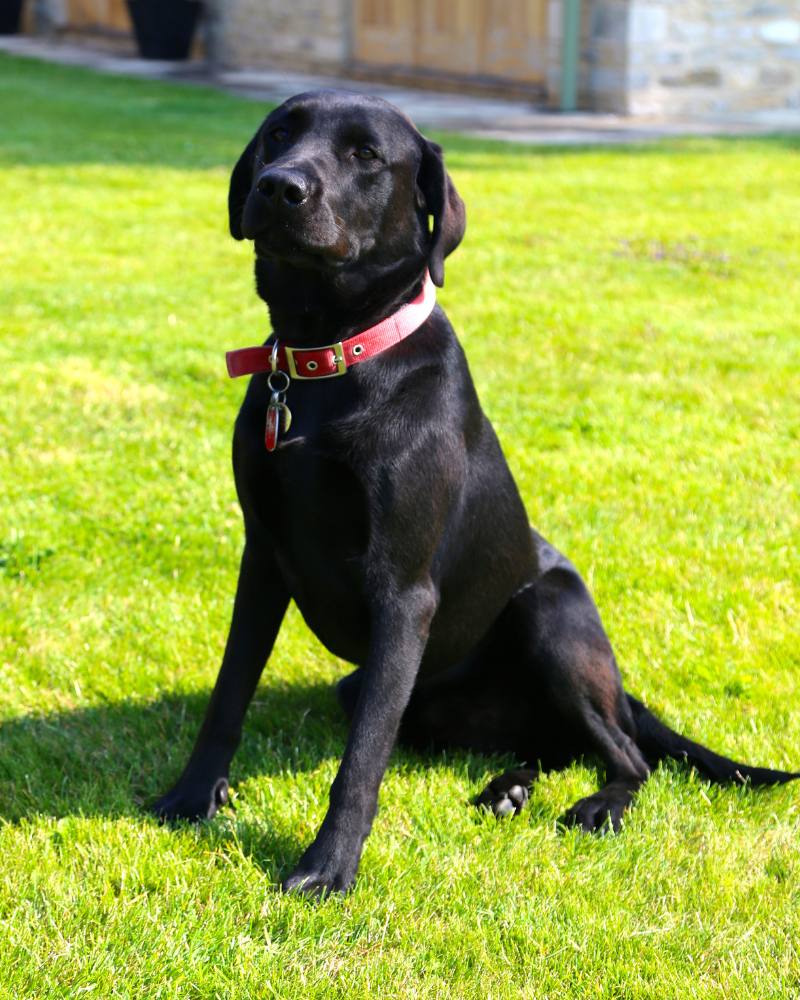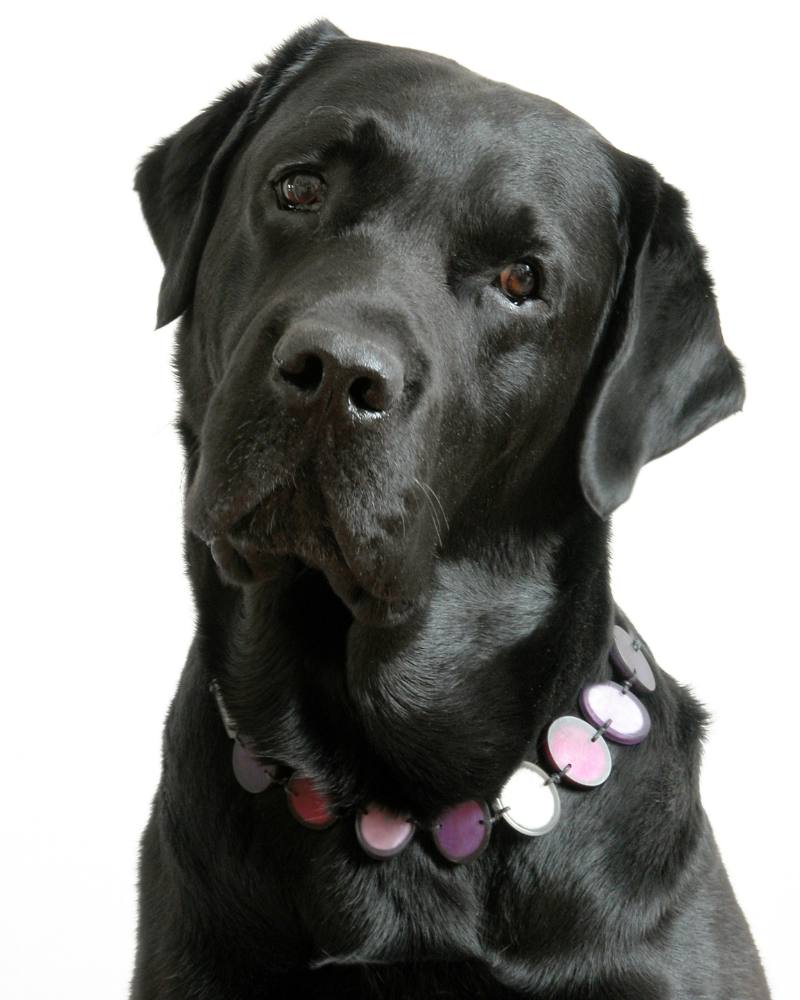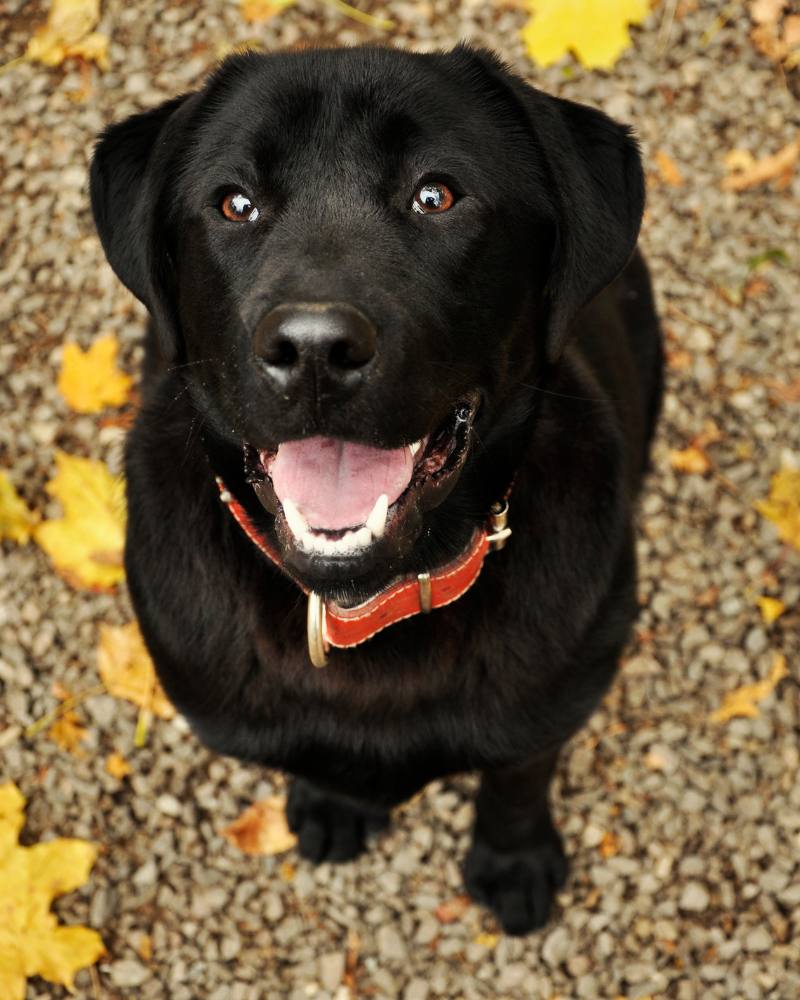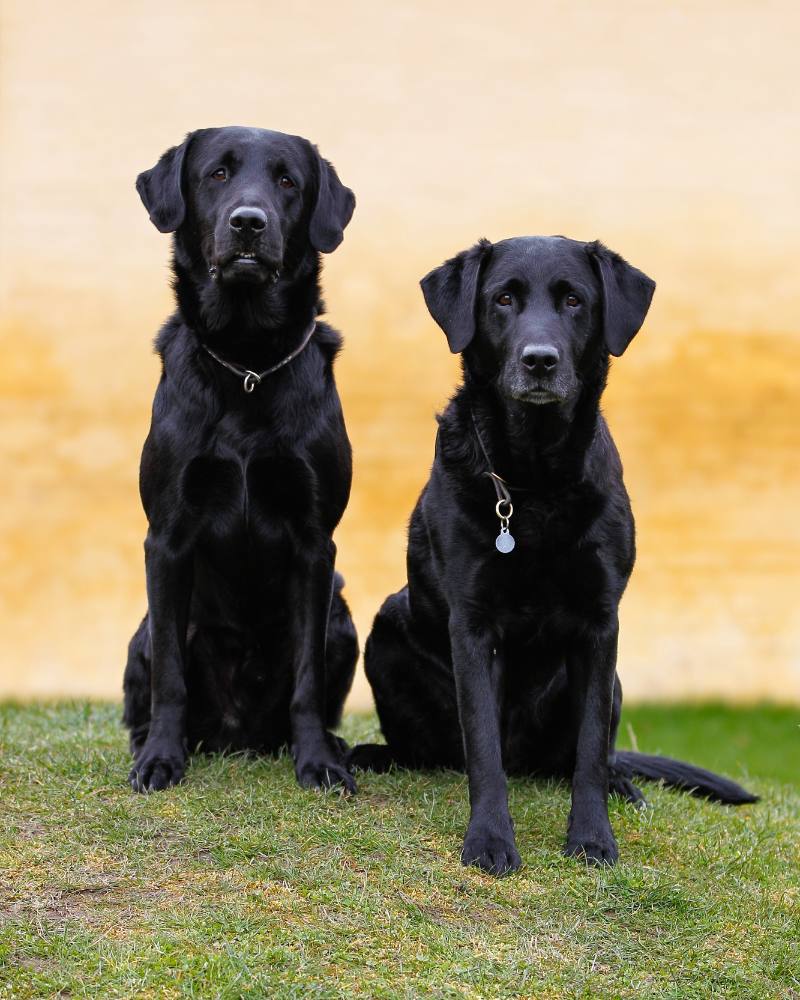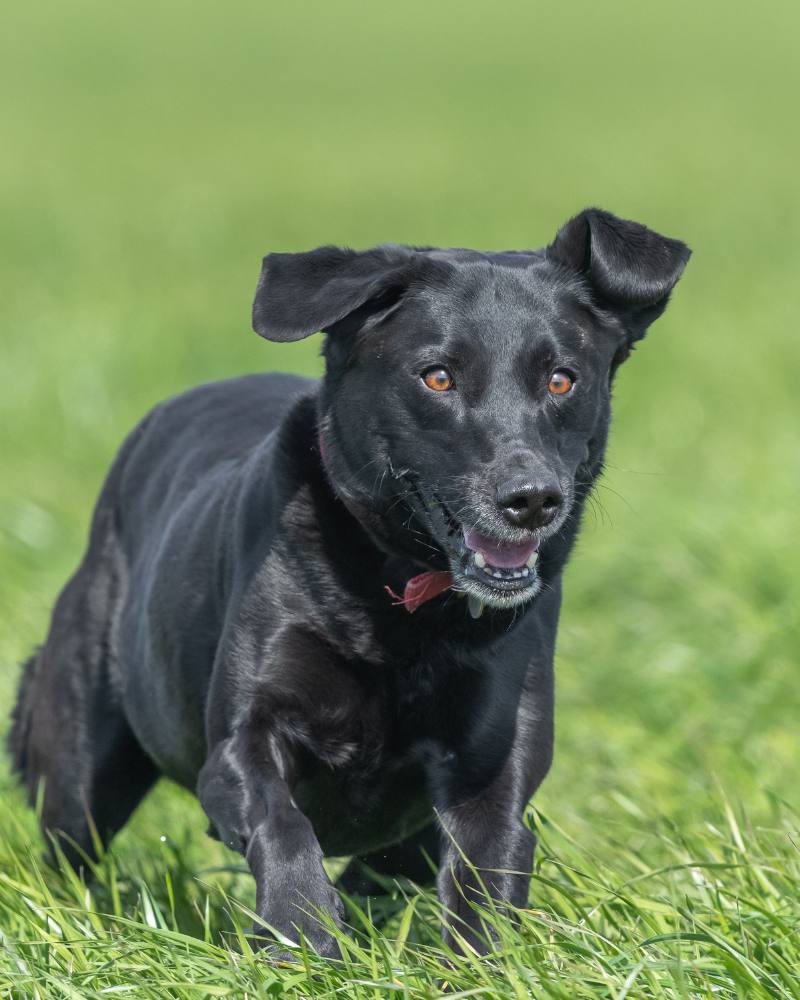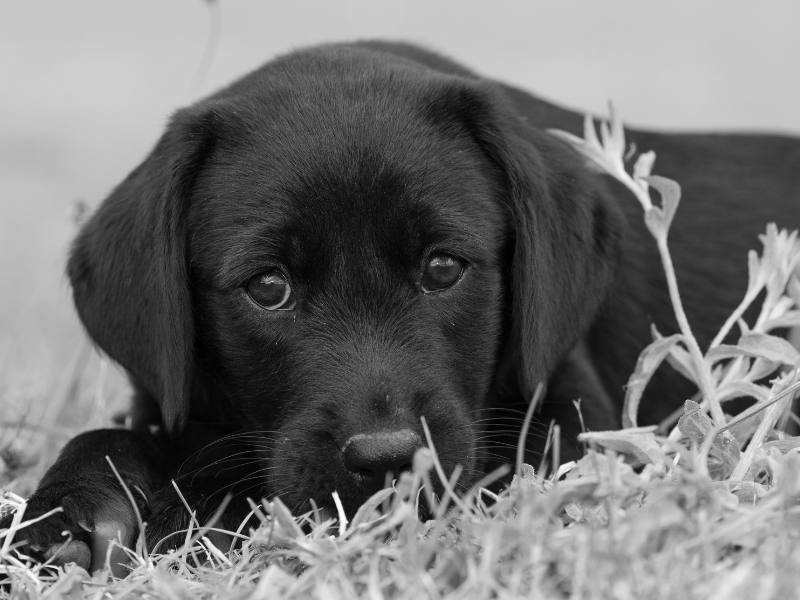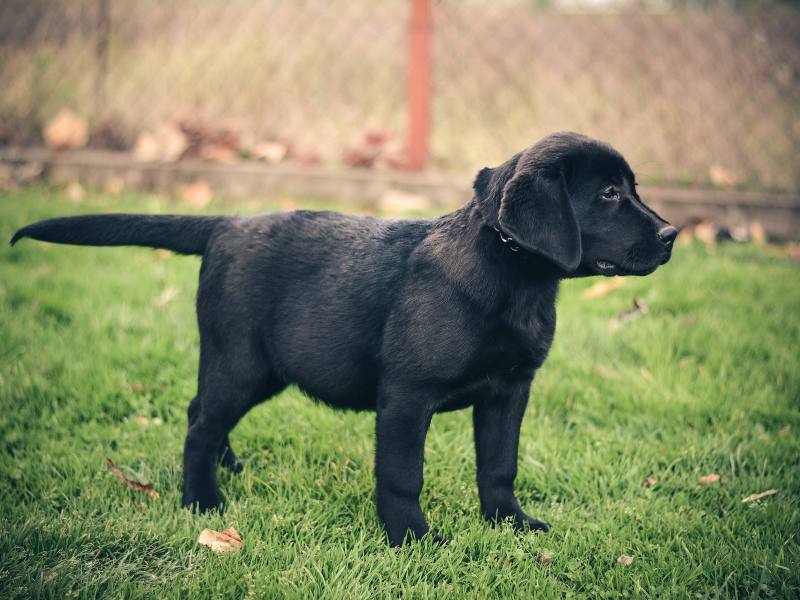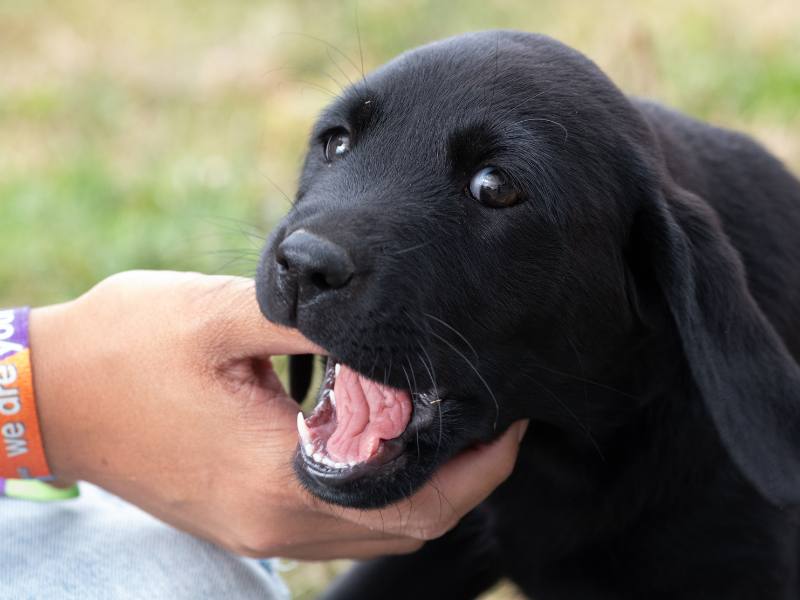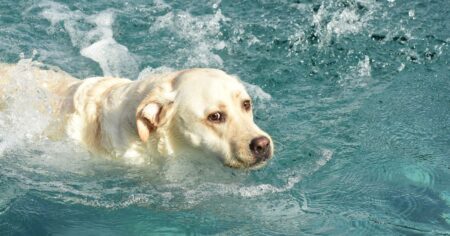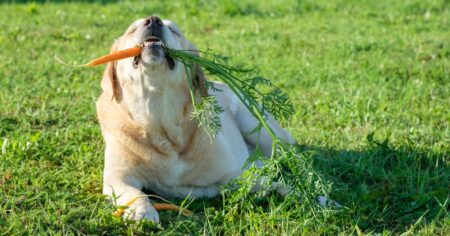Black Labradors are a popular breed of dog that are well-known for their friendly and loyal temperament. They are a variation of the Labrador Retriever breed and come in three color varieties: yellow, chocolate, and black. With their unique intelligence and family-friendly reputation, black Labs have become a popular choice for a family companion pet for years.
The black Lab is the most common color of the Labrador Retriever, with the yellow and chocolate colors being the other two. They are a medium to large-sized breed, with an adult black Lab weighing anywhere from 55 to 80 lbs and standing from 21 to 24.5 inches tall at the shoulder. They are known for their high energy levels and require lots of activity to keep them healthy and happy.
Black Labradors have a long history of being employed as duck retrievers and fisherman’s mates. They are also used as guide dogs for the blind, search and rescue dogs, and as therapy dogs. The breed’s steady climb to popularity began in the early 1900s, and they have since become one of the most beloved dog breeds in the world.
Get To Know Your Black Lab
Black Labrador Retrievers are known for their friendly and loyal nature. They bond strongly with their family and make great companions for children and adults alike. Their playful and energetic personality makes them great for families with active lifestyles.
Black Labs are also known for their intelligence and trainability. They are quick learners and respond well to positive reinforcement training methods. This makes them great candidates for obedience training, agility, and other dog sports.
In terms of physical characteristics, black Labs have a sleek, water-resistant coat that requires regular grooming to keep it looking healthy and shiny. They are medium to large-sized dogs, with males typically weighing between 65-80 pounds and females weighing between 55-70 pounds.
Black Labs have a lifespan of around 12 years and are generally healthy dogs. However, like all breeds, they are prone to certain health issues such as hip and elbow dysplasia, eye problems, and obesity. It’s important to keep up with regular vet check-ups and maintain a healthy diet and exercise routine to keep your black Lab in top shape.
Where Do Black Labs Come From?
Black Labs are a variation of the popular and beloved Labrador Retriever breed. According to The Labrador Site, the first Labradors were bred from a now-extinct breed known as the St. John’s Water Dog. This breed was also most likely the route of the rather different, and bigger, Newfoundland.
Labradors are not from Canada’s town “Labrador,” as some may think. They are actually from Newfoundland. Black Labs we see today are descended from St. John’s Dogs. In the past, the most preferred Labs color was black. Yellow and Chocolate Labradors were culled soon after birth, and only black ones were kept.
According to The Labrador Dog, the St. John’s Water Dog was used in the early 1800s by English nobles to retrieve game birds. They were imported to England, where they were crossed with other breeds to create the Labrador Retriever we know and love today.
How Is The Black Color Inherited In Labs?
Labrador Retrievers come in three recognized colors: black, chocolate, and yellow. The black color in labs is inherited through a B locus gene. This gene determines the amount of eumelanin pigment in a dog’s coat. The more eumelanin pigment a lab has, the darker its coat will be.
Every Labrador inherits two B genes, one from each parent. The dominant B gene is responsible for the black coat color, while the recessive b gene is responsible for the chocolate coat color. If a lab inherits two b genes, it will be chocolate. If it inherits one B gene and one b gene, it will also be black but will carry the chocolate gene and can pass it on to its offspring.
It’s important to note that not all black labs are the same shade. Some black labs are born with the dilute gene, which essentially tones down the shade of their coat color. This genetic twist can make a black lab look charcoal instead of the traditional dark shade that we are most familiar with.
Understanding the genetics of black labs can be helpful for breeders who want to produce litters with a certain coat color. However, it’s important to remember that coat color should not be the only factor considered when breeding. Health, temperament, and other factors should also be taken into account to ensure the best possible outcome for the litter and the breed as a whole.
Black Labs vs Chocolate Labs
Black Labs and Chocolate Labs are both popular breeds of Labrador Retriever. While they share many similarities, there are also some differences between the two.
One of the most obvious differences is their coat color. Black Labs have a solid black coat, while Chocolate Labs have a coat that ranges from mahogany to deep, dark brown. In either color, a small white patch on the chest is permissible.
Another difference is in their physical characteristics. Black Labs have black noses and eye rims, and mid to dark brown eyes. Chocolate Labs have brown noses and eye rims, and light brown or hazel eyes.
When it comes to temperament, both Black Labs and Chocolate Labs are known for being friendly, loyal, and intelligent. However, some people believe that Chocolate Labs can be more hyperactive and stubborn than their Black Lab counterparts.
Ultimately, the decision between a Black Lab and a Chocolate Lab comes down to personal preference. Both breeds make great pets and are excellent family dogs.
Black Labs vs Yellow Labs
Black Labs and Yellow Labs are two of the most popular dog breeds in the United States. Both breeds are known for their friendly and loyal personalities, making them excellent family pets. However, there are some differences between the two breeds that potential owners should be aware of.
One of the most obvious differences between Black Labs and Yellow Labs is their coat color. Black Labs have a solid black coat, while Yellow Labs can range from a creamy white to a deep golden color. Some people may have a preference for one color over the other, but ultimately, it comes down to personal preference.
Another difference between the two breeds is their temperament. While both breeds are friendly and loyal, Yellow Labs are often described as more playful and energetic, while Black Labs are known for being more laid-back and calm. This may make Yellow Labs a better choice for families with young children who want a dog that can keep up with their energy levels.
When it comes to training, both Black Labs and Yellow Labs are intelligent and eager to please their owners. However, Black Labs may be better suited for certain types of work, such as hunting or search and rescue, due to their athleticism and strong work ethic. Yellow Labs, on the other hand, may be better suited as therapy dogs or emotional support animals due to their friendly and sociable nature.
Ultimately, the decision between a Black Lab and a Yellow Lab comes down to personal preference and lifestyle. Both breeds make excellent family pets and will bring their owners joy and companionship.
Charcoal Labradors
Charcoal Labradors, also known as Dilute Black Labrador Retrievers, have a unique coat color, a lighter, diluted version of the traditional black Labrador Retriever. Their coats are often mistaken for silver, but they are a shade of gray with a hint of black. Despite the controversy surrounding their genetics, Charcoal Labs are considered purebred.
These dogs are descended from the traditional black Labrador Retriever and still possess all of the same traits that make them such great pets. They are intelligent, loyal, and playful, making them the perfect companion for families and individuals alike.
Charcoal Labradors have been bred for generations as hunting companions. They were originally bred for their ability to retrieve game from land and water, and their intelligence and trainability made them a favorite among hunters. Today, they are still used for hunting but are also popular as family pets and service animals.
Like all Labrador Retrievers, Charcoal Labs are known for their friendly and outgoing personalities. They love to be around people and are great with children. They are also highly trainable and excel in obedience training, agility, and other dog sports.
If you are considering adding a Charcoal Labrador to your family, it is important to find a reputable breeder who can provide you with a healthy and well-socialized puppy. These dogs require regular exercise and mental stimulation, so be prepared to provide them with plenty of playtime and training sessions.
Popularity of Black Labs
Black Labs have always been the most prevalent color among the Labrador Retriever breed. However, their popularity has changed over the years. In the sporting dog community, owners of hunting dogs still often prefer the black coat, but pet and show owners often prefer the paler colors.
Despite this shift in popularity, black Labs are still one of the most beloved dog breeds in America. In fact, they have been the most popular breed in the United States for 31 years in a row, according to the American Kennel Club. Their friendly, outgoing nature and high-spirited personality make them popular for families and individuals alike.
One reason for the enduring popularity of black Labs is their versatility. They are excellent retrievers, making them a favorite among hunters and fishermen. They are also highly trainable and make great service, therapy, and search-and-rescue dogs. Their intelligence and loyalty make them an ideal companion for people of all ages and lifestyles.
Black Dogs Are Harder To Rehome
Black dogs, including black Labradors, are often harder to rehome than dogs of other colors. This is due to a sad phenomenon in pet shelters, which impacts the rehoming rate of black dogs. Not only do these pups not photograph as well, they simply aren’t as easy to rehome in person either. Lots of people don’t want a black dog.
According to The Labrador Site, black dogs are often overlooked in shelters because people assume they are less friendly or more aggressive than dogs of other colors. This is simply not true. In fact, black Labradors are just as friendly and loyal as their yellow and chocolate counterparts.
Another reason black dogs are harder to rehome is that they are more difficult to photograph well. This can make it harder for potential adopters to get a good look at them and fall in love with them. As a result, black dogs tend to spend more time in shelters waiting for their forever homes.
Despite these challenges, black Labradors make wonderful pets. They are loyal, friendly, and intelligent dogs that are great with kids and families. If you’re considering adopting a black Labrador, don’t let their color deter you. With a little patience and love, you can give a black Lab the forever home they deserve.
Black Lab Characteristics
Black Labrador Retrievers are known for their friendly and outgoing personalities. They are loyal, intelligent, and eager to please their owners. They are also highly trainable and make excellent family pets.
One of the most distinctive characteristics of the black Labrador is its sleek, water-resistant coat. This shiny black coat is thick and dense, providing protection from the elements and helping the dog stay warm in cold weather. Black Labs also have soft, flapped ears and a thick otter tail that give them an almost seal-like appearance.
Black Labs are medium-sized dogs, standing at around 21.5 to 24.5 inches tall and weighing between 55 and 80 pounds. They are sturdy and strong, with an athletic build that makes them well-suited for a variety of activities, including hunting, swimming, and agility training.
These dogs are also known for their love of water. They have strong webbed paws that make them excellent swimmers and are often used as water rescue dogs. In fact, the Labrador Retriever is the most popular breed for water rescue work.
Black Labrador Retrievers are friendly, loyal, and highly adaptable dogs that make excellent companions for families and individuals. Whether you’re looking for a hunting partner, a swimming buddy, or just a loyal and loving pet, a black Lab may be the perfect dog for you.
How Big Do Black Labs Get?
Black Labrador Retrievers are a medium to large breed of dog, with males being slightly larger than females. According to The Labrador Site, adult black Labs typically weigh between 55 to 80 pounds and stand from 21 to 24.5 inches tall at the shoulder. Females are usually on the smaller end of the spectrum, while males tend to be larger.
However, it’s important to note that the size of a black Lab can vary depending on their lineage and upbringing. As The Happy Puppy Site explains, American and English lines can have different physical characteristics. So, a black Lab from American lines may be slightly taller and leaner than one from English lines.
It’s also worth mentioning that individual black Labs can vary in size and weight, even within the same litter. As The Labrador Site notes, “your dog is probably not an average dog!”
Overall, black Labs are a sturdy and athletic breed, with a strong and muscular build. They are often used as working dogs due to their strength and endurance, and require plenty of exercise to stay healthy and happy.
Black Lab Temperament
Black Labrador Retrievers are known for their friendly and sociable nature. They are excellent family dogs and get along well with children and other household pets. Their outgoing personality makes them a popular choice for families who are looking for a loyal and loving companion.
In addition to being friendly, Black Labs are also highly energetic and athletic. They enjoy spending time outdoors and require regular exercise to keep them healthy and happy. This breed is known for their love of water and many Black Labs enjoy swimming and playing in lakes, rivers, and other bodies of water.
While Black Labs are generally well-behaved, they can become easily distracted if they are not trained properly. It is important to provide them with plenty of socialization and obedience training from a young age to ensure that they grow up to be well-adjusted and well-behaved dogs.
Overall, the Black Lab temperament is a combination of friendliness, energy, and intelligence. They make excellent family pets and are well-suited for families who enjoy spending time outdoors and leading an active lifestyle.
Black Lab Intelligence
Black Labs are known for their intelligence and trainability. They are the 7th smartest dog breed when it comes to obedience and working intelligence, according to The Smart Canine. However, their intelligence goes beyond just following commands.
Black Labs have a strong instinct and intelligence for hunting, which is their original purpose. They possess a natural ability to track and retrieve game, making them excellent hunting companions. Their intelligence also allows them to adapt to various environments and situations with ease.
When it comes to socialization and training, starting early is key. Socializing a black lab puppy between 7 weeks and 4 months old is crucial for developing a well-mannered adult dog. Consistent training and positive reinforcement are also important for a well-trained and obedient black lab.
It’s important to note that while black labs are intelligent, they are also high-energy dogs that require plenty of exercise and mental stimulation. Without proper exercise and stimulation, they can become destructive and develop behavioral issues.
Black Lab Health
Black Labs are generally considered healthy dogs but are still prone to certain health issues that owners should be aware of. As with all purebred dogs, black Labs can inherit genetic diseases that are common to the breed. These diseases are due to the limitations of even the large gene pools.
One of the most common health concerns for black Labs is joint problems such as hip and elbow dysplasia. These conditions affect the hip or elbow joints, prohibiting normal movement and causing pain and immobility. Joint problems are strongly genetic in origin, but the exact genes which cause the problems have not been identified.
Another common health issue for black Labs is eye problems such as cataracts, retinal dysplasia, and progressive retinal atrophy. These conditions can cause blindness or partial loss of vision. Black Labs may also experience heart disorders such as pulmonic stenosis or tricuspid valve dysplasia.
It’s important for owners to be aware of these potential health issues and to take steps to prevent them. Regular veterinary check-ups and proper nutrition and exercise can help keep black Labs healthy and happy.
Avoiding Health Problems
Black Labradors are generally healthy dogs, but like all purebred dogs, they are prone to certain inherited diseases. By taking a few simple steps, you can help ensure that your black Lab stays healthy and happy for years to come.
Diet: A healthy diet is essential for your black Lab’s overall health. Avoid feeding your dog table scraps, which can be high in fat and salt. Instead, choose a high-quality dog food that is appropriate for your dog’s age and activity level. Be sure to read the label carefully and choose a food that lists meat as the first ingredient.
Exercise: Regular exercise is important for your black Lab’s physical and mental well-being. Take your dog for daily walks and provide plenty of opportunities for play and exercise. Swimming is a great form of exercise for Labs, as they are natural swimmers.
Weight Management: Obesity is a common problem in Labradors, which can lead to a variety of health problems. To keep your black Lab at a healthy weight, measure out his food and avoid overfeeding. Provide plenty of opportunities for exercise, and monitor your dog’s weight regularly.
Regular Veterinary Checkups: Regular checkups with your veterinarian can help catch health problems early, when they are easier to treat. Your vet can also provide advice on nutrition, exercise, and other aspects of your black Lab’s care.
By following these simple steps, you can help ensure that your black Lab lives a long, healthy life.
How To Find A Black Lab
Looking for a black Labrador can be an exciting and rewarding experience. Here are some tips to help you find the perfect black Lab:
- Check with local animal shelters and rescue groups. These organizations often have black Labs available for adoption.
- Search online for reputable breeders in your area. Make sure to do your research and ask for references before choosing a breeder.
- Attend dog shows and events to meet breeders and see their dogs in person. This can also be a great opportunity to learn more about the breed.
- Ask other black Lab owners for recommendations on where to find a quality dog. They may be able to refer you to a breeder or shelter.
When searching for a black Lab, it’s important to keep in mind that reputable breeders and shelters will prioritize the health and well-being of their dogs. They will also be knowledgeable about the breed and able to answer any questions you may have.
Be wary of breeders or sellers who make exaggerated or false claims about their dogs, or who are unable to provide health clearances and other important documentation. It’s always better to take the time to find a reputable source for your black Lab, rather than risking the health and happiness of your new furry friend.
Choosing a Black Lab Breeder
When looking for a black Lab breeder, choosing one with a good reputation and is committed to breeding healthy, well-tempered puppies is important. Here are some tips for finding the right breeder:
- Ask for referrals from friends or family members who own black Labs.
- Research breeders online and read reviews from previous customers.
- Check to see if the breeder is registered with the American Kennel Club (AKC) or other reputable dog breeding organizations.
- Visit the breeder’s facility to see the living conditions of the puppies and their parents.
It’s important to note that a good breeder will also ask you questions to ensure that you are a good fit for one of their puppies. They may ask about your lifestyle, living situation, and experience with dogs.
When visiting a breeder, take note of the following:
- The cleanliness of the facility
- The temperament of the puppies and their parents
- The health of the puppies and their parents
- The breeder’s knowledge of the breed and their willingness to answer your questions
Remember, a responsible breeder will prioritize the health and well-being of their puppies over making a profit. They will also be willing to provide you with documentation of the puppy’s health and any genetic testing that has been done.
Rescuing a Black Labrador
Rescuing a black Labrador can be a rewarding experience for both the dog and the owner. There are many black Labrador rescue organizations that can help connect you with a rescue dog in need of a loving home.
When adopting a black Labrador, it’s important to consider the dog’s background and history. Some rescue dogs may have experienced neglect or abuse, and may require extra patience and care to help them adjust to their new home.
Before adopting a black Labrador, it’s important to make sure you have the time, resources, and space to provide for the dog’s needs. This includes providing a safe and comfortable living environment, regular exercise and playtime, and proper nutrition and healthcare.
When adopting a black Labrador, it’s also important to consider the dog’s personality and temperament. Some black Labradors may be more energetic and outgoing, while others may be more laid-back and reserved. It’s important to find a dog that matches your lifestyle and personality, and to be patient and understanding as the dog adjusts to their new home.
Overall, rescuing a black Labrador can be a fulfilling and rewarding experience for both the dog and the owner. By providing a loving home and proper care, you can help give a rescue dog a second chance at a happy and healthy life.
Training and Exercising Your Black Lab
Training and exercising your black Lab are essential to ensure they stay healthy and happy. As a highly active breed, black Labs require plenty of exercise to keep them fit and to prevent them from becoming bored and destructive.
Training your black Lab should begin at an early age to ensure they develop good behavior and obedience. Positive reinforcement techniques, such as using treats and praise, are effective methods for training your black Lab. Consistency is also key, as black Labs respond well to a regular routine and clear boundaries.
When it comes to exercise, black Labs require plenty of physical activity to keep them stimulated and healthy. A daily walk or run is a great way to provide your black Lab with the required exercise. Additionally, playing games such as fetch or frisbee can help to keep your black Lab engaged and active.
Swimming is also an excellent form of exercise for black Labs, as they are natural swimmers. If you have access to a pool or a safe body of water, swimming can be an enjoyable and effective way to keep your black Lab fit and healthy.
It is important to note that black Labs can be prone to obesity, so it is crucial to monitor their diet and exercise levels. Overfeeding and lack of exercise can lead to weight gain, which can cause health problems for your black Lab. A balanced diet and regular exercise routine can help to prevent obesity and keep your black Lab healthy and happy.
Black Lab Grooming
Black Labrador Retrievers have a double coat that requires regular grooming to keep them healthy and looking their best. Regularly grooming your black lab helps reduce shedding, prevent matting, and keep their skin healthy.
One of the most important aspects of black lab grooming is brushing. A firm bristle brush should be used to remove any dirt, debris, and loose fur from their coat. It’s recommended to brush your black lab once or twice a week to keep their coat looking shiny and healthy. Brushing also helps to distribute the natural oils in their coat, which can help to prevent dry skin and other skin conditions.
In addition to brushing, bathing is also an important part of black lab grooming. It’s recommended to bathe your black lab every 3 months or as needed, depending on how dirty they get. When bathing your black lab, it’s important to use a dog-specific shampoo and conditioner to avoid drying out their skin. Make sure to rinse thoroughly to avoid any leftover shampoo residue, which can cause skin irritation.
Another important aspect of black lab grooming is ear cleaning. Black labradors are prone to ear infections, so it’s important to clean their ears regularly to prevent any buildup of wax or debris. Use a dampened cotton ball to gently clean the inside of their ear, being careful not to go too deep and damage their ear canal.
Finally, nail trimming is also an important part of black lab grooming. Overgrown nails can cause discomfort and even lead to joint problems, so it’s important to trim your black lab’s nails regularly. If you’re not comfortable doing it yourself, consider taking them to a professional groomer or veterinarian to have it done.
Caring For An Old Black Labrador
As with any dog, caring for an old black Labrador requires some special attention. Black Labradors, like all Labradors, are prone to certain health issues, particularly as they age. The following tips can help ensure your old black Labrador remains healthy and happy:
- Regular vet check-ups: As your black Labrador ages, it is important to take them to the vet for regular check-ups. This can help catch any health issues early on and ensure they receive the proper treatment.
- Proper diet: An old black Labrador’s dietary needs may change as they age. It is important to feed them a high-quality diet that is appropriate for their age and health needs. Consult with your vet for recommendations on the best diet for your dog.
- Exercise: Although an old black Labrador may not be as active as they once were, it is still important to provide them with regular exercise. This can help keep them at a healthy weight and maintain their mobility.
- Comfortable living environment: As your black Labrador ages, they may develop arthritis or other mobility issues. Providing them with a comfortable living environment, such as a soft bed or cushioned flooring, can help ease any discomfort they may experience.
It is important to remember that caring for an old black Labrador requires patience and understanding. As they age, they may not be able to do all the things they once could, but with proper care and attention, they can still lead happy and fulfilling lives.
Famous Black Labs
Black Labs are among the most popular dog breeds in the world, and it’s no wonder why. They are intelligent, loyal, and make great family pets. But did you know that some Black Labs have achieved fame and even celebrity status? Here are a few famous Black Labs:
| Name | Claim to Fame |
|---|---|
| Buddy | Featured in the movie “Air Bud” |
| Bo | Family pet of former U.S. President Barack Obama |
| Jet | Assistance dog for a young boy with autism |
Buddy, the star of the “Air Bud” movies, was a talented basketball player who could shoot hoops with the best of them. Bo, the Obama family’s pet, was often seen playing on the White House lawn and even made appearances in some of the First Lady’s public service announcements. Jet, an assistance dog, helped a young boy with autism navigate the world and provided him with comfort and companionship.
These are just a few examples of the many Black Labs who have made a difference in the world. Whether they are movie stars, presidential pets, or just beloved family members, Black Labs are sure to capture the hearts of anyone who meets them.
What Is So Special About Black Labs?
Black Labs are a popular breed of dog, and for good reason. They are known for their friendly personalities, loyalty, and intelligence. They are also highly adaptable and make great family pets and excellent hunting companions.
One of the most notable features of black Labs is their coloring. Their shiny black coats are sleek and beautiful, and they are often described as having a regal appearance. However, their beauty is not just skin deep. Black Labs are also known for their athleticism and strength, which make them excellent working dogs.
Another special feature of black Labs is their love for water. They are natural swimmers and are often used in water rescue operations. Their webbed paws and powerful tails make them strong swimmers, and they can also easily retrieve objects from the water.
Black Labs are also known for their intelligence and trainability. They are quick learners and are often used as service, therapy, and search and rescue dogs. They strongly desire to please their owners and are highly motivated by positive reinforcement training techniques.
Overall, black Labs are a special dog breed with many unique qualities. They are beautiful, loyal, intelligent, and highly adaptable, making them excellent companions for a variety of lifestyles and activities.


